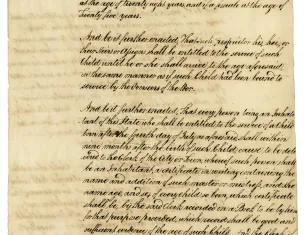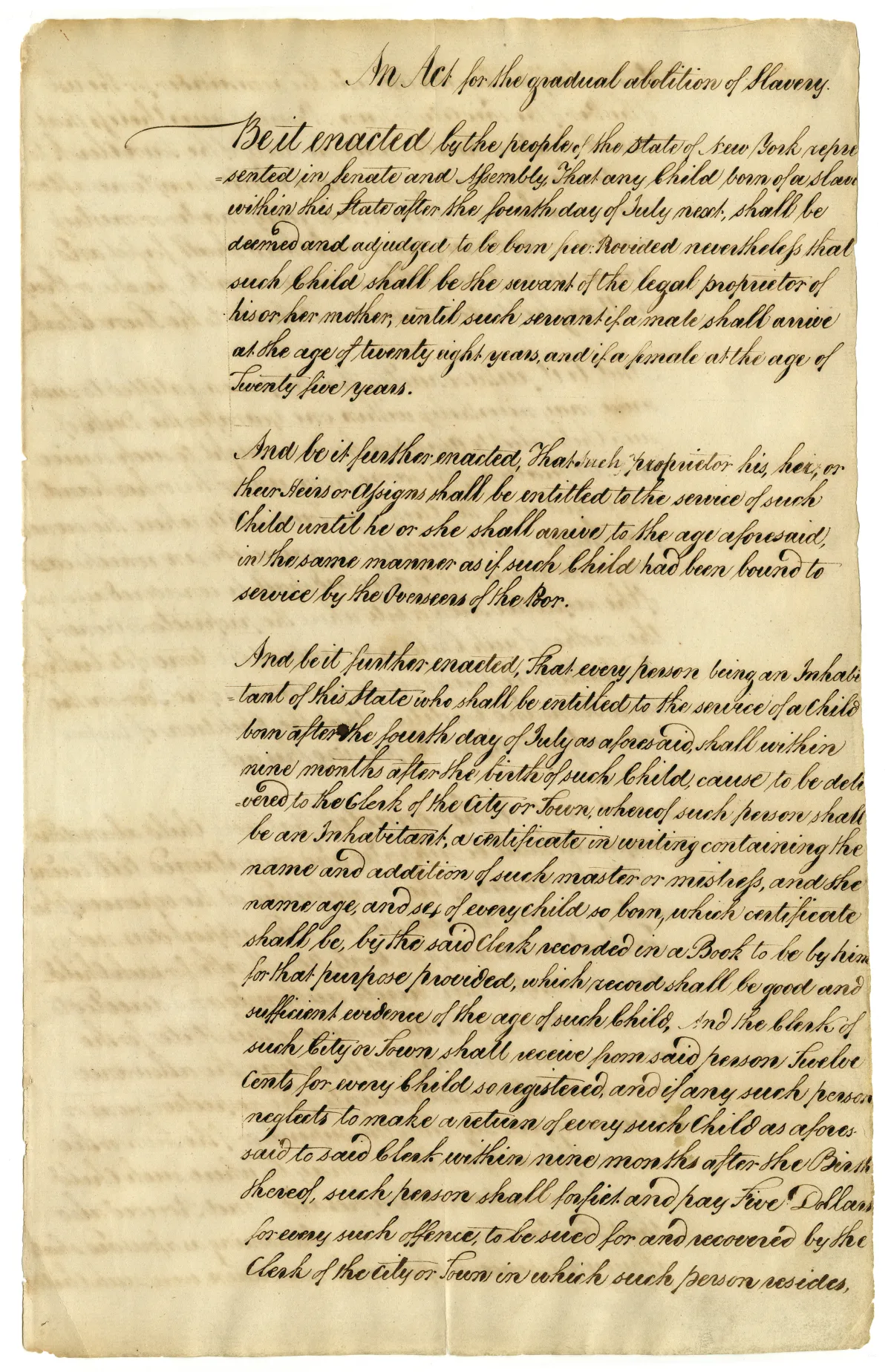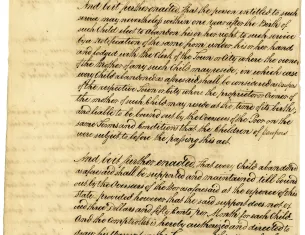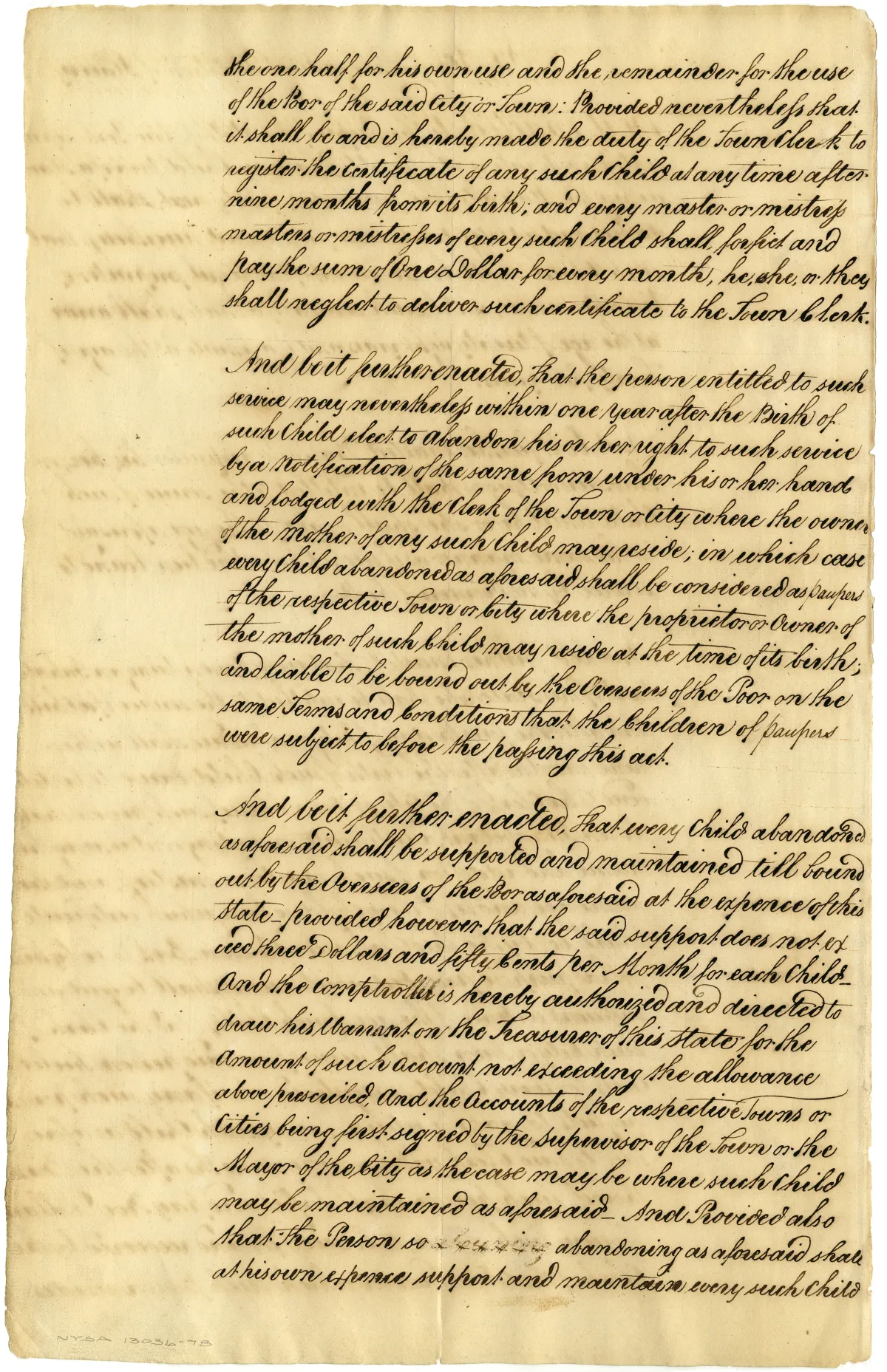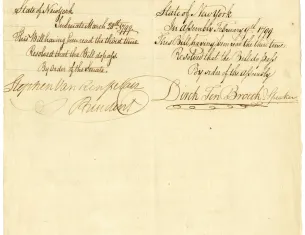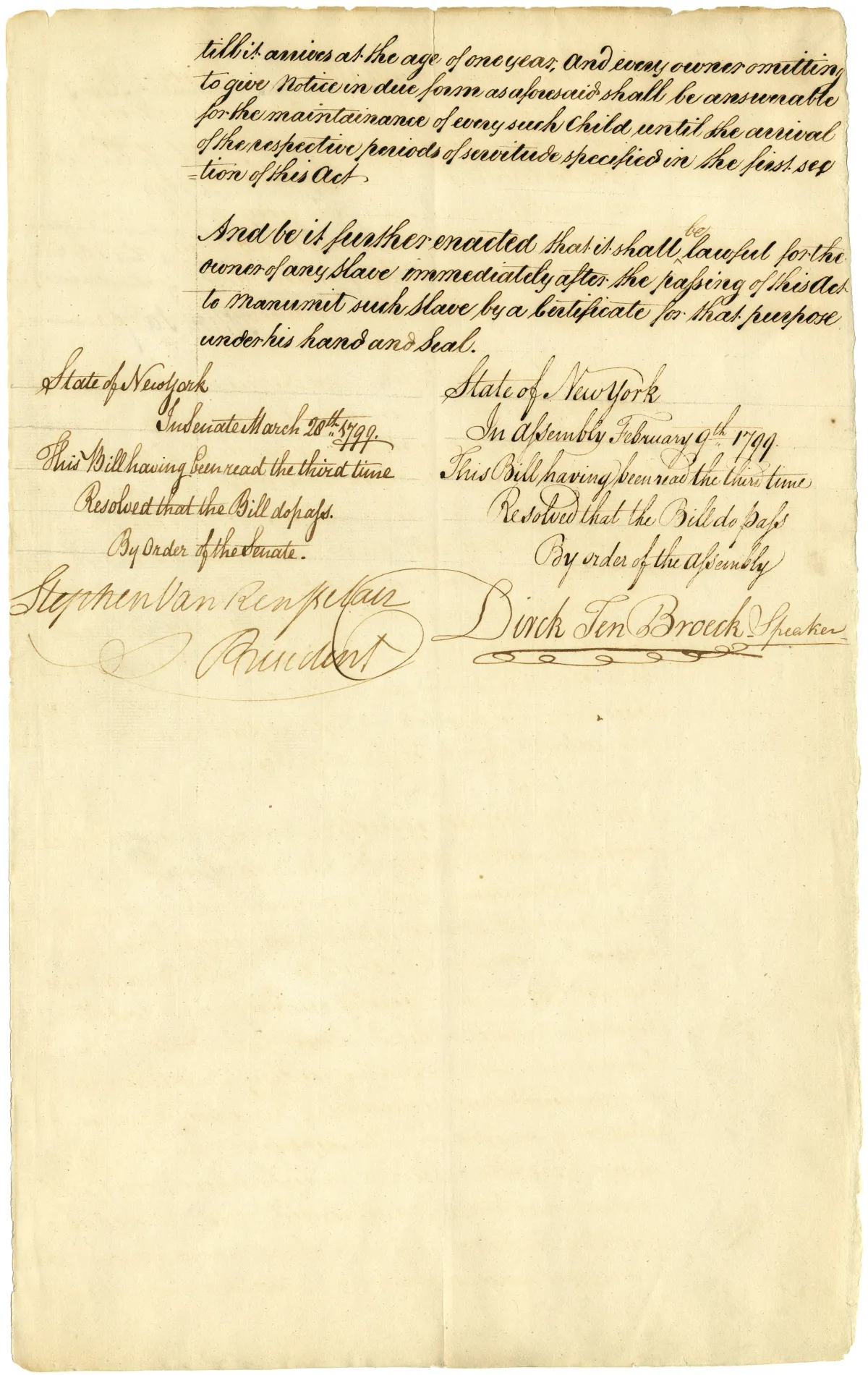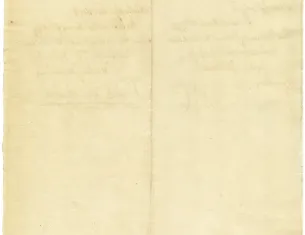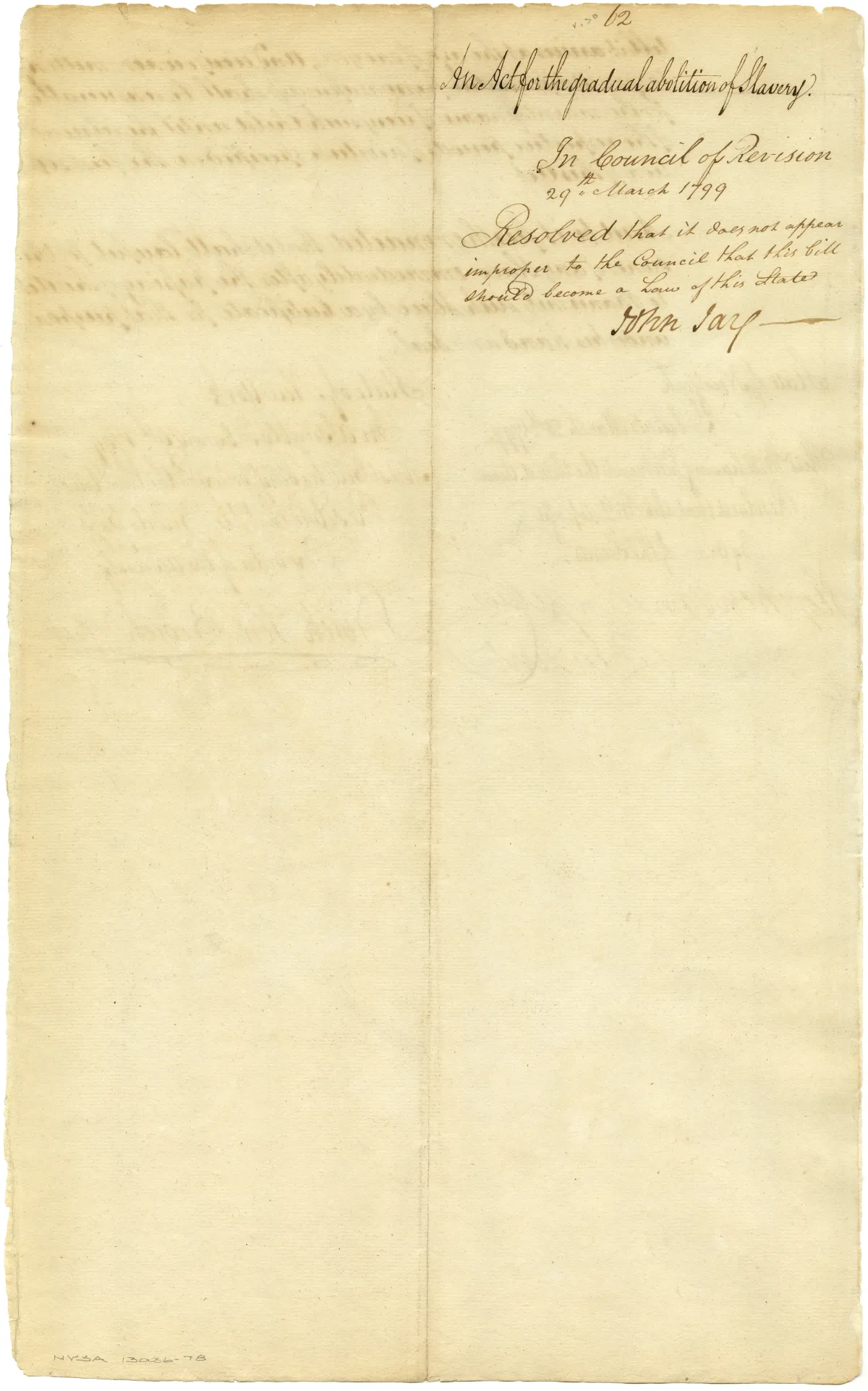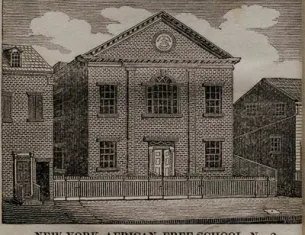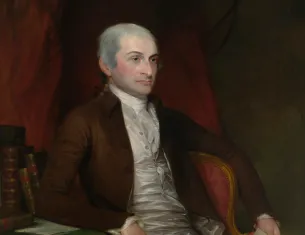An Act for the Gradual Abolition of Slavery, New York State, 1799
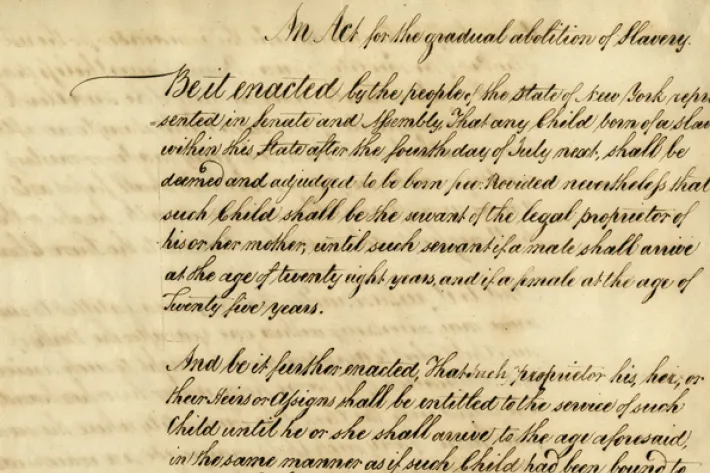
An Act for the Gradual Abolition of Slavery, New York State, 1799 (New York State Digital Archives)
John Jay advocated the abolition of slavery throughout his career, although he did own slaves himself. He argued that he would “purchase slaves and manumit them at proper ages.” He was a founder and the first chairman of the New-York Manumission Society and helped support the African Free School. Jay proposed abolishing slavery in New York State’s first constitution in 1777, but he could not get enough support at the time. However, when he became governor of New York in 1799, the Act for the Gradual Abolition of Slavery passed both the Senate and the Assembly with little opposition and Jay signed it into law.
An Act for the Gradual Abolition of Slavery, New York State, 1799
Be it enacted by the people of the State of New York represented in Senate and Assembly, That any Child born of a slave within this State after the fourth day of July next, shall be deemed and adjudged to be born free: Provided nevertheless that such Child shall be the servant of the legal proprietor of his or her mother; until such servant if a male shall arrive at the age of twenty eight years, and if a female at the age of Twenty five years.
And be it further enacted, That such proprietor his, her, or their Heirs or Assigns shall be entitled to the service of such Child until he or she shall arrive to the age aforesaid, in the same manner as if such Child had been bound to service by the Overseers of the Poor.
And be it further enacted, That every person being an Inhabitant of this State who shall be entitled to the service of a Child born after the fourth day of July as aforesaid, shall within nine months after the birth of such Child, cause to be delivered to the Clerk of the City or Town, whereof such person shall be an Inhabitant; a certificate in writing containing the name and addition of such master or mistress, and the name, age, and sex of every child so born, which certificate shall be, by the said clerk recorded in a Book to be by him for that purpose provided, which record shall be good and sufficient evidence of the age of such Child, and the Clerk of such City of Town shall receive from said person Twelve cents for every Child so registered, and if any such person neglects to make a return of every such Child as aforesaid to said Clerk within nine months after the Birth thereof, such person shall forfeit and pay Five Dollars for every such offence, to be sued for and recovered by the Clerk of the City or Town in which such person resides, the one half for his own use and the remainder for the use of the Poor of the said City or Town: Provided nevertheless that it shall be and is hereby made the duty of the Town Clerk to register the certificate of any such Child at any time after nine months from its birth; and every master or mistress masters or mistresses of every such Child shall forfeit and pay the sum of One Dollar for every month, he, she, or they shall neglect to deliver such certificate to the Town Clerk.
And be it further enacted, That the person entitled to such service may nevertheless within one years after the Birth of such Child elect to abandon his or her right to such service by a notification of the same from under his or her hand and lodged with the Clerk of the Town or City where the owner of the mother of any such Child may reside; in which case every Child abandoned as aforesaid shall be considered as paupers of the respective Town or City where the proprietor or Owner of the mother of such Child may reside at the time of its birth; and liable to be bound out by the Overseers of the Poor on the same Terms and Conditions that the Children of paupers were subject to before the passing this act.
And be it further enacted, That every Child abandoned as aforesaid shall be supported and maintained till bound out by the Overseers of the Poor as aforesaid at the expence of this State – provided however that the said support does not exceed three Dollars and fifty Cents per Month for each Child – and the comptroller is hereby authorized and directed to draw his warrant on the Treasurer of this State for the amount of such account not exceeding the allowance above prescribed, and the accounts of the respective Towns or Cities being first signed by the Supervisor of the Town or the Mayor of the City as the case may be where such Child may be maintained as aforesaid – And Provided also that the Person so abandoning as aforesaid shall at his own expence support and maintain every such Child till it arrives at the age of one year; and every owner omitting to give notice in due form as aforesaid shall be answerable for the maintainance of every such Child until the arrival of the respective periods of servitude specified in the first section of this Act
And be it further enacted that is shall be lawful for the owner of any Slave immediately after the passing of this Act to manumit such Slave by a Certificate for that purpose under his hand and Seal.
State of New York
In Senate March 28th 1799.
This Bill having been read the third time
Resolved that the Bill do pass.
By Order of the Senate.
Stephen Van Rensselaer
President
State of New York
In Assembly February 9th 1799
This bill having been read the third time
Resolved that the Bill do pass
By order of the Assembly
Dirck Ten Broeck, Speaker
An Act for the gradual abolition of Slavery.
In Council of Revision
29th March 1799
Resolved that it does not appear
improper to the Council that this bill
should become a Law of this State
John Jay
Source: An Act for the Gradual Abolition of Slavery, New York State, 1799, New York State Archives. New York (State). Dept. of State. Bureau of Miscellaneous Records. Enrolled acts of the State Legislature, 1778–2005. Series 13036-78. Laws of 1799. Chapter 62.
An Act for the Gradual Abolition of Slavery, New York State, 1799
Be it enacted by the people of the State of New York represented in Senate and Assembly, That any Child born of a slave within this State after the fourth day of July next, shall be deemed and adjudged to be born free: Provided nevertheless that such Child shall be the servant of the legal proprietor of his or her mother; until such servant if a male shall arrive at the age of twenty eight years, and if a female at the age of Twenty five years.
And be it further enacted, That such proprietor his, her, or their Heirs or Assigns shall be entitled to the service of such Child until he or she shall arrive to the age aforesaid, in the same manner as if such Child had been bound to service by the Overseers of the Poor.
And be it further enacted . . . shall within nine months after the birth of such Child, cause to be delivered to the Clerk of the City or Town, whereof such person shall be an Inhabitant; a certificate in writing containing the name and addition of such master or mistress, and the name, age, and sex of every child so born, . . . shall receive from said person Twelve cents for every Child so registered . . .
And be it further enacted, That the person entitled to such service may nevertheless within one years after the Birth of such Child elect to abandon his or her right to such service . . . aforesaid shall be considered as paupers of the respective Town or City . . .
And be it further enacted, That every Child abandoned as aforesaid shall be supported and maintained till bound out by the Overseers of the Poor as aforesaid at the expence of this State – provided however that the said support does not exceed three Dollars and fifty Cents per Month for each Child . . .
And be it further enacted that is shall be lawful for the owner of any Slave immediately after the passing of this Act to manumit such Slave by a Certificate for that purpose under his hand and Seal.
State of New York
In Senate March 28th 1799
Source: An Act for the Gradual Abolition of Slavery, New York State, 1799, New York State Archives. New York (State). Dept. of State. Bureau of Miscellaneous Records. Enrolled acts of the State Legislature, 1778–2005. Series 13036-78. Laws of 1799. Chapter 62.
aforesaid - mentioned earlier
manumit - release from slavery
Background
John Jay advocated the abolition of slavery throughout his career, although he did own slaves himself. He argued that he would “purchase slaves and manumit them at proper ages.” He was a founder and the first chairman of the New-York Manumission Society and helped support the African Free School. Jay proposed abolishing slavery in New York State’s first constitution in 1777, but he could not get enough support at the time. However, when he became governor of New York in 1799, the Act for the Gradual Abolition of Slavery passed both the Senate and the Assembly with little opposition and Jay signed it into law.
Transcript
An Act for the Gradual Abolition of Slavery, New York State, 1799
Be it enacted by the people of the State of New York represented in Senate and Assembly, That any Child born of a slave within this State after the fourth day of July next, shall be deemed and adjudged to be born free: Provided nevertheless that such Child shall be the servant of the legal proprietor of his or her mother; until such servant if a male shall arrive at the age of twenty eight years, and if a female at the age of Twenty five years.
And be it further enacted, That such proprietor his, her, or their Heirs or Assigns shall be entitled to the service of such Child until he or she shall arrive to the age aforesaid, in the same manner as if such Child had been bound to service by the Overseers of the Poor.
And be it further enacted, That every person being an Inhabitant of this State who shall be entitled to the service of a Child born after the fourth day of July as aforesaid, shall within nine months after the birth of such Child, cause to be delivered to the Clerk of the City or Town, whereof such person shall be an Inhabitant; a certificate in writing containing the name and addition of such master or mistress, and the name, age, and sex of every child so born, which certificate shall be, by the said clerk recorded in a Book to be by him for that purpose provided, which record shall be good and sufficient evidence of the age of such Child, and the Clerk of such City of Town shall receive from said person Twelve cents for every Child so registered, and if any such person neglects to make a return of every such Child as aforesaid to said Clerk within nine months after the Birth thereof, such person shall forfeit and pay Five Dollars for every such offence, to be sued for and recovered by the Clerk of the City or Town in which such person resides, the one half for his own use and the remainder for the use of the Poor of the said City or Town: Provided nevertheless that it shall be and is hereby made the duty of the Town Clerk to register the certificate of any such Child at any time after nine months from its birth; and every master or mistress masters or mistresses of every such Child shall forfeit and pay the sum of One Dollar for every month, he, she, or they shall neglect to deliver such certificate to the Town Clerk.
And be it further enacted, That the person entitled to such service may nevertheless within one years after the Birth of such Child elect to abandon his or her right to such service by a notification of the same from under his or her hand and lodged with the Clerk of the Town or City where the owner of the mother of any such Child may reside; in which case every Child abandoned as aforesaid shall be considered as paupers of the respective Town or City where the proprietor or Owner of the mother of such Child may reside at the time of its birth; and liable to be bound out by the Overseers of the Poor on the same Terms and Conditions that the Children of paupers were subject to before the passing this act.
And be it further enacted, That every Child abandoned as aforesaid shall be supported and maintained till bound out by the Overseers of the Poor as aforesaid at the expence of this State – provided however that the said support does not exceed three Dollars and fifty Cents per Month for each Child – and the comptroller is hereby authorized and directed to draw his warrant on the Treasurer of this State for the amount of such account not exceeding the allowance above prescribed, and the accounts of the respective Towns or Cities being first signed by the Supervisor of the Town or the Mayor of the City as the case may be where such Child may be maintained as aforesaid – And Provided also that the Person so abandoning as aforesaid shall at his own expence support and maintain every such Child till it arrives at the age of one year; and every owner omitting to give notice in due form as aforesaid shall be answerable for the maintainance of every such Child until the arrival of the respective periods of servitude specified in the first section of this Act
And be it further enacted that is shall be lawful for the owner of any Slave immediately after the passing of this Act to manumit such Slave by a Certificate for that purpose under his hand and Seal.
State of New York
In Senate March 28th 1799.
This Bill having been read the third time
Resolved that the Bill do pass.
By Order of the Senate.
Stephen Van Rensselaer
President
State of New York
In Assembly February 9th 1799
This bill having been read the third time
Resolved that the Bill do pass
By order of the Assembly
Dirck Ten Broeck, Speaker
An Act for the gradual abolition of Slavery.
In Council of Revision
29th March 1799
Resolved that it does not appear
improper to the Council that this bill
should become a Law of this State
John Jay
Source: An Act for the Gradual Abolition of Slavery, New York State, 1799, New York State Archives. New York (State). Dept. of State. Bureau of Miscellaneous Records. Enrolled acts of the State Legislature, 1778–2005. Series 13036-78. Laws of 1799. Chapter 62.
Excerpt
An Act for the Gradual Abolition of Slavery, New York State, 1799
Be it enacted by the people of the State of New York represented in Senate and Assembly, That any Child born of a slave within this State after the fourth day of July next, shall be deemed and adjudged to be born free: Provided nevertheless that such Child shall be the servant of the legal proprietor of his or her mother; until such servant if a male shall arrive at the age of twenty eight years, and if a female at the age of Twenty five years.
And be it further enacted, That such proprietor his, her, or their Heirs or Assigns shall be entitled to the service of such Child until he or she shall arrive to the age aforesaid, in the same manner as if such Child had been bound to service by the Overseers of the Poor.
And be it further enacted . . . shall within nine months after the birth of such Child, cause to be delivered to the Clerk of the City or Town, whereof such person shall be an Inhabitant; a certificate in writing containing the name and addition of such master or mistress, and the name, age, and sex of every child so born, . . . shall receive from said person Twelve cents for every Child so registered . . .
And be it further enacted, That the person entitled to such service may nevertheless within one years after the Birth of such Child elect to abandon his or her right to such service . . . aforesaid shall be considered as paupers of the respective Town or City . . .
And be it further enacted, That every Child abandoned as aforesaid shall be supported and maintained till bound out by the Overseers of the Poor as aforesaid at the expence of this State – provided however that the said support does not exceed three Dollars and fifty Cents per Month for each Child . . .
And be it further enacted that is shall be lawful for the owner of any Slave immediately after the passing of this Act to manumit such Slave by a Certificate for that purpose under his hand and Seal.
State of New York
In Senate March 28th 1799
Source: An Act for the Gradual Abolition of Slavery, New York State, 1799, New York State Archives. New York (State). Dept. of State. Bureau of Miscellaneous Records. Enrolled acts of the State Legislature, 1778–2005. Series 13036-78. Laws of 1799. Chapter 62.
aforesaid - mentioned earlier
manumit - release from slavery
